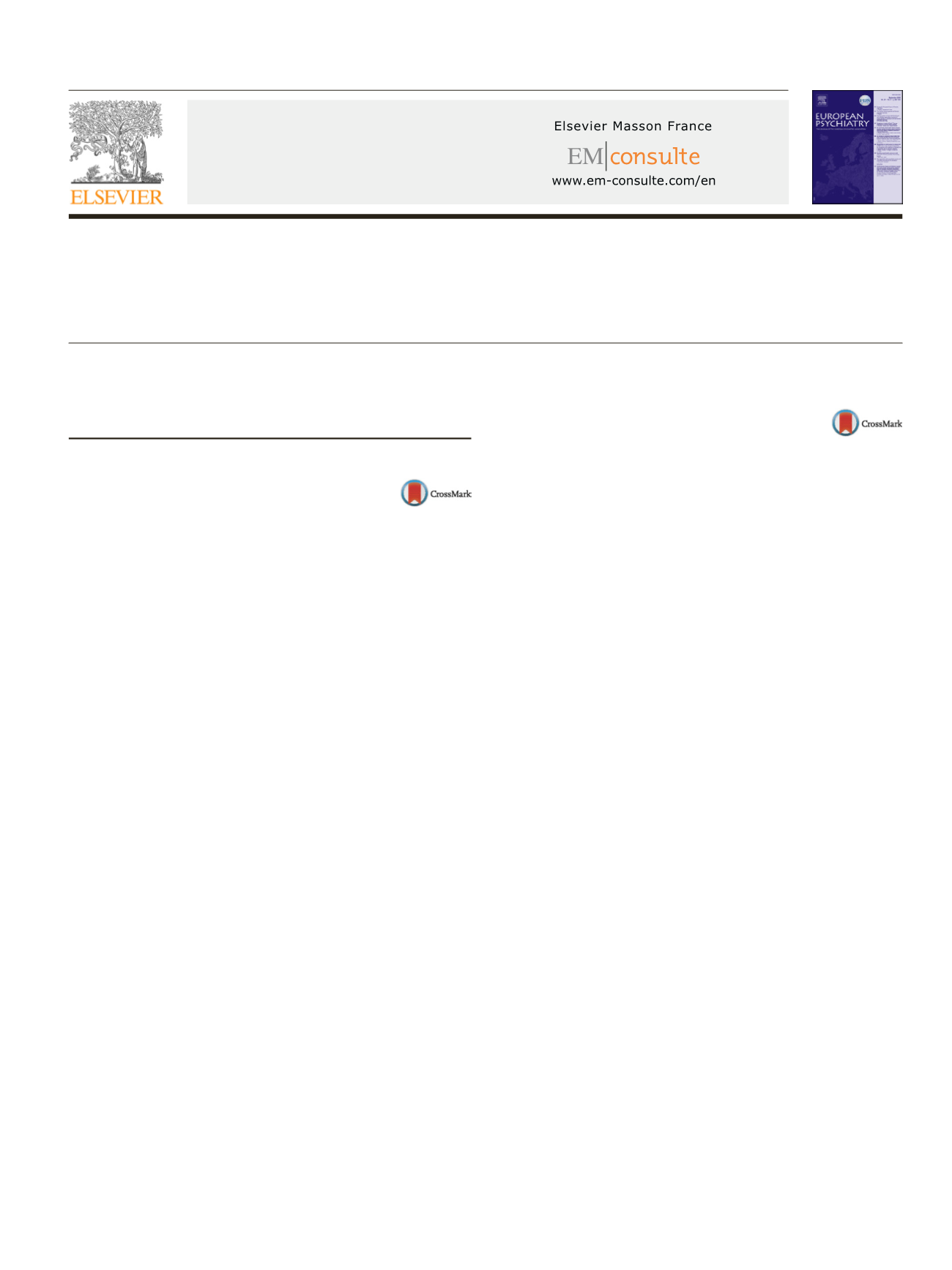
 European Psychiatry 41S (2017) S405–S464
European Psychiatry 41S (2017) S405–S464
Available online at
ScienceDirect
www.sciencedirect.com25th European Congress of Psychiatry
ePoster viewing part 1
e-Poster viewing: anxiety disorders and
somatoform disorders
EV0001
Cross cultural aspects of OCD in Islam
and clinical practice
W.I. Abouhendy
Faculty of Medicine, Zagazig University, Psychiatry, Zagazig, Egypt
Introduction
Religious obsessions and compulsive acts compro-
mise approximately two thirds of all obsessive compulsive disorder
symptomatology in Muslim patients. Imam’s mosque is consulted
before a psychiatrist.
Objectives
To explore the Islamic jurist’s views and methods in
dealing with obsessions and compulsions.
Aims
Introduction of guidelines for managing OCD in some Mus-
lim patients.
Methods
We began studying the different opinions of scholars
in defining obsessive compulsive behaviour focusing on the tight
criteria required by the Maliki Jurists to consider the individual
being obsessed. This was followed by a thorough review of other
Islamic doctrines.
Results
The jurisprudential therapeutic approach includes:
– obsessions are satanic whispers not originating from the self,
which is equivalent to “It is not me but my OCD” in modern cogni-
tive behavioural approach;
– diverting attention fromthe obsessive thought rather than engag-
ing with it;
– not to respond to the obsessional thought (response prevention);
– listing of religious permits;
– focusing attention on acts of worship;
– thought stopping.
At the end we added various jurisprudential rules to be remem-
bered by patients such as certainty does not fade with scepticism,
no defiles by doubt, there are no doubts for a man with excessive
doubts.
Conclusion
Exposure and response prevention techniques are
deeply rooted in Islamic jurisprudence and are practised with con-
viction by OCD Muslim patients. We produced specific guidelines
that could be used by clinical psychologists and othermental health
professionals in dealingwith OCD patients top ensure their engage-
ment in therapy.
Disclosure of interest
The author has not supplied his declaration
of competing interest.
http://dx.doi.org/10.1016/j.eurpsy.2017.01.330EV0002
Treatment of maternal antenatal
depression
S. Arsova
∗
, N. Manuseva
University Psychiatry Clinic, Day Hospital, Skopje, The Former
Yugoslav Republic of Macedonia
∗
Corresponding author.
Introduction
World statistical data show that a large number of
mothers suffer from antenatal or postnatal depression and that it
is linked with difficulties in personal and emotional development
in child.
Aim
To present the importance of treatment of antenatal depres-
sion.
Material and methods
We present is a 32-year-old woman man,
with completed high level of education, married, mother of one
child, pregnant in first trimester, who suffered of depression several
years ago. Diagnosis was made in line with the ICD 10 (F33), and
the following diagnostic instruments were used: HAMA, HAMD,
clinical interview.
We present is a 32-year-old woman man, with completed high
level of education, married, mother of one child, pregnant in first
trimester, severe depression with depressive mood, weight lost,
insomnia, agitation, suicidal thoughts.
She was treated in the day hospital of our clinic with SSRI antide-
pressants, individual and group psychotherapy.
Results
During the day hospital stay patient was treated with
pharmacologic agents (SSRI anti-depressants – tbl. Sertralline),
which showed a great success, that is reduction in the depression,
sleep improvement, normal gainweight and regular pregnancy and
baby birth with APGAR score 9/9.
Discussion
Literature shows that antenatal depression is asso-
ciated with poor mother self-care during pregnancy including
poor visit of antenatal clinics, substance misuse, low birth weight,
preterm delivery and significant intellectual and emotional deficits
in children whose mothers were suffered of antenatal or postnatal
depression.
Conclusion
Treatment of antenatal or postnatal depression is
very important for mothers’ mental health and for the normal
develops of child also.
Disclosure of interest
The authors have not supplied their decla-
ration of competing interest.
http://dx.doi.org/10.1016/j.eurpsy.2017.01.3310924-9338/


















